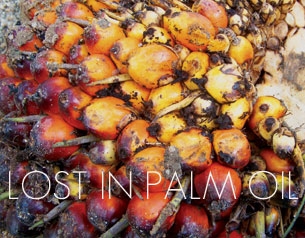Lost in Palm Oil
Palm oil, used to produce biofuel, is being billed as a sustainable solution to the world's energy problems. But does it deserve its reputation?
 Palm oil, used to produce biofuel, is being billed as a sustainable solution to the world's energy problems. According to an EU directive, by 2030 all petrol must contain at least 20% biofuel. But does palm oil deserve its 'green' reputation? What are the human and environmental costs of the explosion in palm oil plantations? This week's documentary investigates how palm oil cultivation is contributing to global warming. It reveals how indigenous tribes are being forced from their land, rivers and water supplies polluted and rainforests destroyed by a rapacious palm oil industry.
Palm oil, used to produce biofuel, is being billed as a sustainable solution to the world's energy problems. According to an EU directive, by 2030 all petrol must contain at least 20% biofuel. But does palm oil deserve its 'green' reputation? What are the human and environmental costs of the explosion in palm oil plantations? This week's documentary investigates how palm oil cultivation is contributing to global warming. It reveals how indigenous tribes are being forced from their land, rivers and water supplies polluted and rainforests destroyed by a rapacious palm oil industry.
"Stop chopping down our forest. We can't allow them to cut another tree", laments Din Perulak, head of the Orang Rimba tribe. "The forest which sustained us has completely disappeared." Every day, thousands of hectares of rainforest in Sumatra are cleared to make way for palm oil plantations. International investors plan on turning an area the size of the United Kingdom into palm oil monocultures. "It pains us to watch how the forests are being destroyed forever", states Din Perulak.
For the Organ Rimba people, the loss of the rainforest doesn't simply mean an end to their traditional way of life. The forest is sacred to them and they firmly believe they are predestined to care for it. "It's as if our mother is dying". Now, with no forest to sustain them, Din Perolak and his clan are forced to beg food from local farmers. The palm oil boom has robbed them of their dignity and the basis of their livelihood.
The quickest way to claim forests for plantations is by slash and burn. "Yes, in Indonesia the forest is burning", admits Daud Dharsono, deputy director of palm oil producer Sinar Mas. This method of clearing releases billions of tonnes of carbon dioxide into the atmosphere, contributing to global warming. Once the trees are gone, the damp peat of the forest floor is exposed to the sun, releasing yet more carbon dioxide. Indonesia is now the world's third largest producer of greenhouse gases.
The destruction of the rainforests is an environmental disaster that scientists believe is irreversible. But it's not the only environmental problem caused by palm oil monocultures. Phosphates from fertilisers leach into rivers and lakes, polluting the water supply and making it impossible to grow anything else. Endangered animals like orang-utans are losing their last remaining habitats. And toxic pesticides used on the plantations have been linked with the deaths of a million people worldwide.
Many monocultures are planted on land stolen from local people. I'm furious. These palm oils are on my land but I don't get anything from the harvest", complains one farmer. "They simply came and took our woodlands away from us". This is confirmed by the deputy mayor of Sarolongun. "These land conflicts are due to the way the investors operate." In a landmark ruling, Sinar Mas, was forced by the government to return stolen land. But it is now attempting to force farmers to pay for the palm oil plantations illegally cultivated on their land.
But victories against the industry are rare. When forest is converted to plantations; "the local population doesn't benefit at all", complains Din Perulak. Some people get a few weeks work planting the monocultures. Then the work dries up and all that's left is a huge palm tree desert. A dead forest without animals or people.
For the foreign investors, backed by EU subsidies, there's a fortune to be made from this green gold. It's the people of Sumatra who stand to lose everything.
FULL SYNOPSIS
